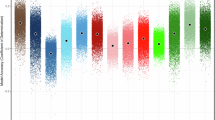Abstract
Context: The principles behind the process of creating new, spontaneous sequences out of previously ordered non-declarative stimuli have been scarcely addressed and, for such reason, remain highly unknown.
Objective:
This paper has four interconnected goals:(1) Introduce a new software-based neuropsychological test that can be used as a means to assess key aspects of the way people order and reorder non-declarative stimuli, based upon cognitive dissonance principles; (2) introduce a mathematical approach to the latter in ordering/re-ordering of non-declarative stimuli;(3) assess whether the principles of cognitive dissonance in ordering/re-ordering hold for a cohort of young adults with upper socio-economic level;(4) access the extent to which the same holds for children and adolescents and trace a curve of maturation of cognitive dissonance in ordering/re-ordering. Methods: Our multi-age and multi-language social Network Test implies the two stages, first the subject must order figures of human faces in order of preference, next, the software provides him with different pairs of figures which the subject must fulfill in order to built the intermediate arrays that he believe to interconnect the original pair. Our mathematical model is centered around the relation defined by increases in the distance separating these different pairs of figures in the initial order (distances 1, 5 and 11) and related increases in the mean number of intermediate arrays placed in the re-ordering phase; 105 subjects were tested.
Results:
The tendency to produce reorders that are consonant to the one produced in the initial phase increases with age. This trend inspired us to propose a cognitive dissonance index in spontaneous ordering/reordering of non-declarative stimuli, which may formalize the operation of a previously unknown cognitive dimension of the human mind and may serve as an index of cognitive maturation. To the extent that further studies endorse these perspectives, the tests, formulas, and theoretical principals may support new diagnostic methods and explorations in cognitive science.
Similar content being viewed by others
Article PDF
Author information
Authors and Affiliations
Rights and permissions
About this article
Cite this article
Akiba, H., Machado Dias, A., Oda, E. et al. The Role of Cognitive Dissonance in Social Networks. Nat Prec (2011). https://doi.org/10.1038/npre.2011.6682.1
Received:
Accepted:
Published:
DOI: https://doi.org/10.1038/npre.2011.6682.1



